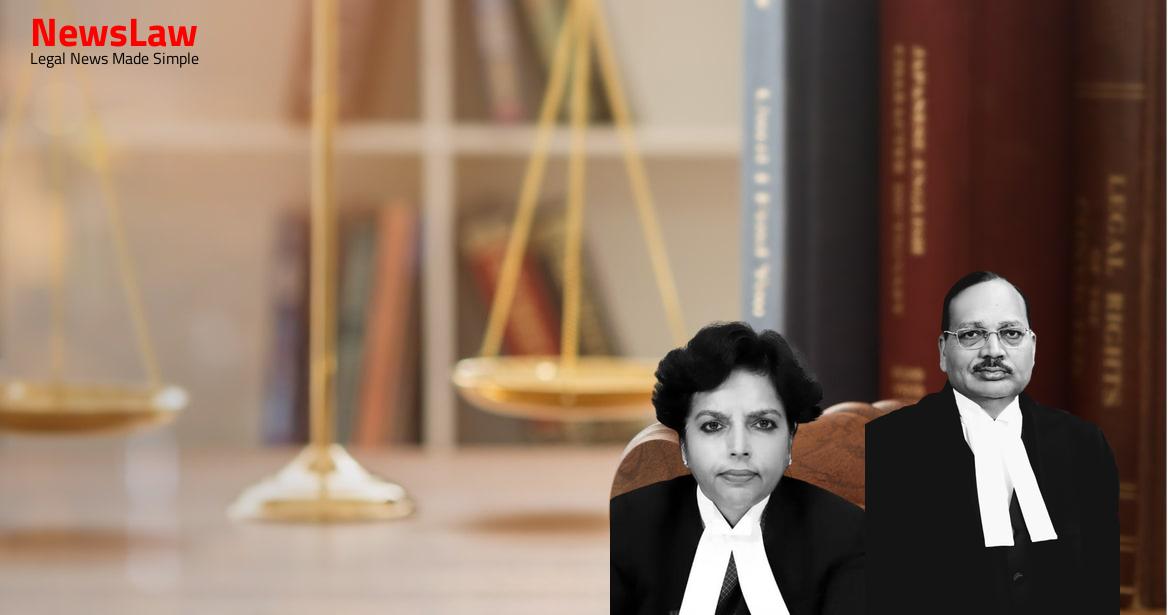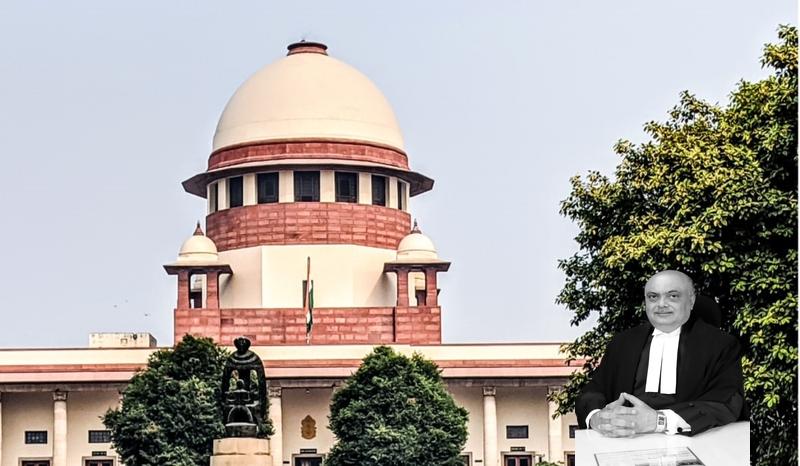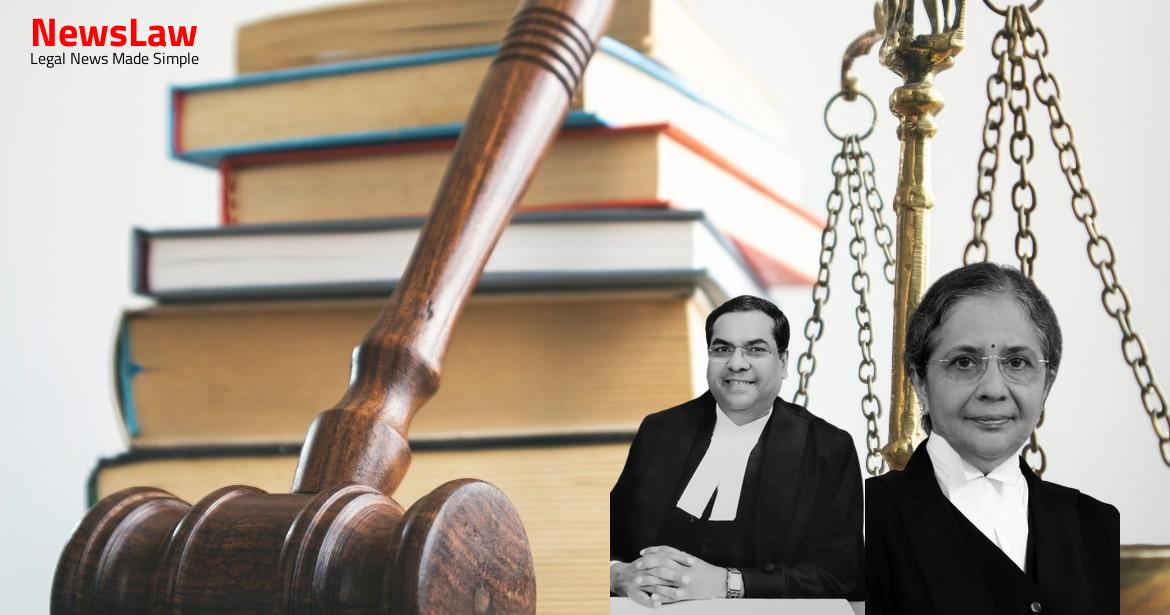In a significant legal development, the Supreme Court of India has pronounced a landmark judgement related to corporate immunity. The case involved intricate legal arguments and extensive references to various laws and legal precedents. The judgement has far-reaching implications for similar cases in the future. Stay tuned to learn more about the details of this crucial ruling and its impact on the legal landscape.
Facts
- Appellant-Company moved High Court of Gujarat challenging an order which was dismissed on 12.12.2011
- Appellant-Company then moved the Supreme Court in a Special Leave Petition (Civil) by reiterating its earlier contentions
- Appellant-Company moved three applications before the Settlement Commission and was granted immunity under the CE Act 1944, CA 1962, and IPC 1860
- Appellant-Company claims its products are cleared from the KASEZ Unit into the DTA with necessary permissions
- Criminal Revision Application No 783 of 2017 was dismissed by the Special Judge at Ahmedabad
- Order dated 01.06.2010 directed for registration of a Special Case against accused including the Appellant-Company
- CBI Special Case No 48 of 2010 was registered
- Allegations arose that Appellant-Company had criminal conspiracy with certain officials between March 2001 to August 2004
- Closure Report was moved before the Special Judge by the Investigation Officer on 05.03.2008
- Assessment Orders observed non-declaration of MRP by the Appellant-Company
- First Information Report was registered on 04.04.2005 at the Gandhinagar branch of Respondent-Agency
- A raid was claimed to have been conducted on the KASEZ Unit of the Appellant-Company
- Allegations related to non-disclosure of MRP on clearances led to Show Cause Notices being issued
- The Appellant-Company sought discharge based on immunity granted under various laws through a Settlement Commission order.
- References to legal precedents were made to argue that mere filing of FIR does not constitute prosecution.
- Contention that the Appellant-Company is not a ‘public servant’ under relevant sections of the law was presented.
- The High Court disagreed with the Appellant-Company’s arguments and upheld the Respondent-Agency’s contentions.
- The learned Special Judge also rejected the Appellant-Company’s application for discharge.
- The Court had previously declined to uphold the Respondent-Agency’s contentions for sanction under Section 197 of the CrPC 1973.
- The Appellant-Company cannot be prosecuted alone for the charge under Section 120B of IPC 1860, as established in previous proceedings.
Analysis
- The court emphasized that the mere registration of an FIR does not constitute the initiation of proceedings for an offence.
- The case cited established that continuing a prosecution post grant of immunity goes against the intent and provisions of the law.
- In a similar case, the appellant was vindicated by the Court’s ruling after factual findings by the Commissioner of Customs favored the appellant.
- The settlement of a case under KVSS 1998 resulted in the withdrawal of an appeal before the court, demonstrating the legality and resolution of the matter.
- Cognizance for an offence is taken only after a Final Report or Chargesheet is submitted in compliance with CrPC 1973.
- The Appellant in this case claimed immunity by various laws, which was acknowledged and supported by orders dated 20.08.2007 and 21.08.2007.
- An observation by the Assessing Authority concluded the Appellant was entitled to a refund, affirming the settlement and lack of fiscal liability.
- The Order taking cognizance against the Appellant was deemed inappropriate as the basis for the alleged offence was found to be non-existent.
- The finality of the Order, unchallenged by Revenue Authorities, reinforced the misuse or abuse of the legal process against the Appellant.
- Investigation and taking of cognizance operate in parallel channels without intermingling.
- Different areas of investigation and cognizance are distinct.
- The principle was established in the case of H.N. Rishbud v. State (Delhi Admn.) in 1955.
- Further elaborated in Abhinandan Jha and Others v. Dinesh Mishra and State of Orissa v. Habibullah Khan.
- Highlighted in Hira Lal Hari Lal Bhagwati v. CBI, New Delhi, even in cases related to specific schemes like KVSS 1998.
- The application for discharge by the Appellant-Company should have been accepted by the Special Judge in light of the additional fact presented.
- Prosecution sanction sought against the officials of KASEZ under PCA 1988 was declined.
Also Read: Judgment on Bail Grant in Society Funds Misappropriation Case Involving Original Name
Decision
- The proceedings against the Appellant-Company have been quashed.
- The Impugned Order dated 15.09.2023 passed by the High Court of Gujarat in CRA No. 783 of 2017 has been set aside.
- The Order dated 01.06.2010 passed by the Special Judge in RC6(A)/2005 has been set aside.
- Pending applications, if any, have been disposed of.
- The present Appeal has been allowed.
Also Read: Acquittal of Accused in NDPS Case: Key Legal Points
Case Title: BACCAROSE PERFUMES AND BEAUTY PRODUCTS PVT. LTD. Vs. CENTRAL BUREAU OF INVESTIGATION (2024 INSC 662)
Case Number: Crl.A. No.-003216-003216 – 2024



